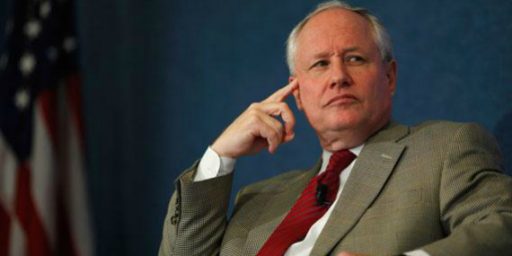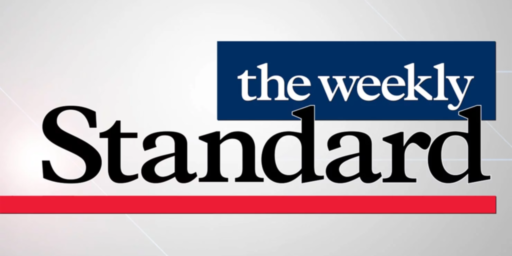William Kristol Speaks
The Weekly Standard editor and Fox News commentator addressed the Kennedy School last night on the meaning of the 2004 elections. Basically, he elaborated on the argument outlined in this post-mortem:
Misunderestimated (Weekly Standard)
On November 2, 2004, George W. Bush won more American votes than any other presidential candidate in history–8 million more than he won in 2000, as a matter of fact. He was the first presidential candidate since 1988 to win more than 50 percent of the popular vote. He was the first incumbent since 1964 to win reelection while simultaneously expanding his party’s representation in both houses of Congress. He had coattails, in other words; Republicans were elected to no fewer than
six Senate seats that had previously been occupied by Democrats, for example, and in all six of those states, Bush ran well ahead of the rest of his party’s ticket.The hair-pullers and teeth-gnashers won’t like it, of course, but we’re nevertheless inclined to call this a Mandate. Indeed, in one sense, we think it an even larger and clearer mandate than those won in the landslide reelection campaigns of Nixon in 1972, Reagan in 1984, and Clinton in 1996. Needless to say, the Nixon, Reagan, and Clinton victory margins were much, much bigger. But that’s in no small part because each of those preceding presidents could plausibly claim to be stage-directing a Morning in America, or building a Bridge to the Twenty-First Century.
George W. Bush could run no such smiley-face campaign. He is a war president. So he has run a war president’s remarkably serious and substantive campaign. That campaign was not without its flaws; Bush had his bad moments, especially in the first debate. But he won the overall campaign debate. And because he won that overall debate–not because the visuals were nifty; not because it was the economy, stupid–he won the right to lead the United States for another four momentous years. George W. Bush’s 2004 election is an accomplishment of ideological confirmation not unlike–obvious box-score distinctions notwithstanding–the one Franklin Roosevelt achieved in 1936.
Except that Roosevelt’s, if anything, was easier. Bush chose the steepest possible climb. A year ago, when the president announced the July 1 transfer of power in Iraq, it was the consensus of cynics everywhere that Karl Rove had informed his boss that politics required him to slither away from Baghdad. Everyone who was anyone, here and in Europe, “knew” that this transfer of sovereignty would be an exit strategy in disguise. Everyone “knew” that Rove would never place his client president before the electorate while 150,000 American troops were still taking daily casualties–and considerable criticism–in the Middle East. Whatever mistakes the administration has made these past 18 months–and there’ve been more than a few too many–President Bush deserves enormous credit simply for staying the course, for rejecting bad advice to cut and run from purported friends and foes alike. On this central question of national security and principle, George W. Bush has proved himself an extraordinarily courageous president.
But he also mentioned a few interesting tidbits — some substantive and some personal. On the first level, when asked how he’d prevent a rancorous debate between the White House and Congressional Republicans, he expressed skepticism about suppressing dissent at all. He thought that it would actually benefit the GOP as it develops into a majority party. Of course, it’s a standard line to say that constructive criticisms are healthy, and a moderate like Kristol has a vested interest in promoting such discussions. But I believe that he was right to insist on keeping party divisions in perspective. After all, he noted, the Democrats faced the same — if not more difficult — dilemmas when they dominated national politics, as Harry Truman’s experiences showed.
More interestingly, perhaps, Kristol described his first campaign, which was as a member of the Harvard-Radcliffe Students for Scoop Jackson. He worked alongside his roommate: Alan Keyes.





